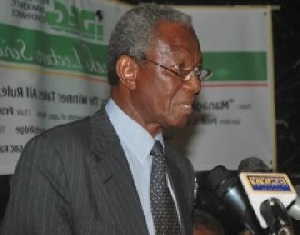The country must not keep depending on donors to solve its economic deficits but rather build a diversified and viable export trade sector that will rake in more foreign earnings and create much needed jobs, Kwame Pianim -- former CEO of New World Renaissance Securities limited -- has said.
Speaking to the B&FT on the sidelines of the third annual Ghana Economic Outlook and Business Strategy Conference, he said a competitive export sector is key to any economy that is on the path of growth.
Mr. Pianim said a borrowing economy is prone to external shocks and that it is about time the country tapped its huge agricultural potential to realise its socio-economic growth prospects.
“A stable macro-economic stability is underpinned by a viable export sector. We need the export trade sector to balance trade, reduce the country’s infrastructural deficits and provide the needed skills to grow the economy.
A competitive export sector is a key economic growth indicator; the rate and depth of export diversification is a litmus test for any economy that is on the course of growth and socio-economic improvement in the lives of its people. Depending on borrowing is not the best solution to the country’s economic problems; it rather exposes the economy to external shocks,” he said.
Mr. Pianim’s call for diversification of the country’s export sector coincides with the recent increase in foreign earnings from the non-traditional exports sub-sector in terms of contribution to total exports.
According to figures from the Trade Ministry, revenues from non-traditional exports in 2013 amounted to US$2.436billion -- which was a 3.05 percent increase over the 2012 figure, and constituted 17.2 percent of total exports.
The provisional estimated value of merchandise exports for 2014 stood at US$10.0678billion, a decrease of 2.8 percent when compared to the 2013 figure of US$10.351billion.
That for merchandise imports was US$10.749billion as at September 2014, relative to US$12.662billion by the same period in 2013, representing a 17.8 percent decline due largely to a reduction in non-oil imports which were affected by depreciation of the cedi against the major trading currencies.
Trade balance for the period January to September 2014 showed a deficit of US$681.3million, compared with a deficit of US$3.848billion as at the end of 2013. The improvement in trade balance was due to a significant 18 percent reduction in imports.
This deficit figure will expectedly improve to US$1.313billion compared to a projected US$2.671billion due to increased exports on the back of higher cocoa prices.
Mr. Pianim said for the country to have a sustained and viable export trade sector that can transform the economy, there is an urgent need to maximise potential of the agric sector and provide the business environment and related infrastructure.
“We must have enough lands for commercial agriculture to increase yields; and we must also be able to add value to these products to support this export trade agenda.
“We need key port infrastructure to ensure speedy transactions, because business is all about time. Then, we must pool a well- motivated workforce with the requisite expertise to run the sector.”
The one-day conference, which was on the theme “Diversifying Ghana’s Economy through Sustained Export Trade”, pooled together economists, sector actors and policymakers to appraise the challenges and current state of the country’s export trade sector, and created a forum for local manufacturers and foreign investors to network for mutual benefits.
Click to view details



Business News of Monday, 26 January 2015
Source: B&FT
Boost export sector to drive economy – Kwame Pianim
Entertainment
















